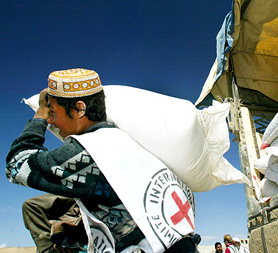Britain’s foreign aid budget: money well spent?
Britain donates more in foreign aid than ever before, with a budget set to eclipse that of the Home Office within four years. As Liam Fox raises concerns, Channel 4 News looks at where the money goes.

In October’s Spending Review, the Department for International Development (DFID) – which delivers aid – emerged a winner.
The government ringfenced and raised DFID‘s budget by 34.2 per cent, to £11.5bn over the next four years. That outruns Britain’s current record spend of 0.56 per cent GDP on overseas aid and will see it rise to 0.7 per cent of GDP in 2013.
It is a controversial commitment at a time when domestic priorities are being cut back, and a commitment that once made law, could limit the government, Defence Secretary Liam Fox has warned.
The Home Office budget meanwhile, which pays for policing and counter-terrorism, has been cut by 25 per cent over the same period, and is set to fall from £10.1bn in the current financial year to £8.3bn in 2014/15.
Bono-Geldof bandwagon
Oxfam’s chief executive Barbara Stocking said Dr Fox was wrong to question David Cameron’s commitment to donating 0.7 per cent of Britain’s GDP in foreign aid. She insists that British aid offers great value to the taxpayer.
“For little more than a penny in the tax pound we not only help those in need but also boost our standing in the world and increase our influence in the global corridors of power.
“Giving legal force to our aid pledge shows we are serious about keeping our promises to the poorest even when times are tough.”
During the general election, all three main political party manifestos committed themselves to the 0.7 per cent target but were criticised by the think-tank International Policy Network for backing an out of date “Bono-Geldof bandwagon”.
The 0.7 per cent target has been an international development aim since the 1970s, one that politicians apparently jump on to appear compassionate but that “has since lost all credibility”, Alec van Gelder from the IPN wrote.
But the government insists it can deliver a credible aid strategy and has set up an aid watchdog, the Independent Commission for Aid Impact (ICAI), to monitor the value for money of aid for British taxpayers.
DFID told Channel 4 News its does not always dole out its funding directly to foreign governments, but also goes through local organisations.
In 2008-09, 27 per cent of aid went directly to governments according to ICAI. Malawi’s government is one well-known beneficiary.

Malawi expulsion
DFID’s distribution of aid to Malawi, one of the poorest countries in the world, has been hampered by handing money directly to the country’s governance system which last year was deemed “not yet fit for purpose” by MPs.
“Much of the Department’s (DFID) programme is routed through the Government of Malawi’s systems, which makes the quality of Malawian governance a key issue,” a Committee of Public Accounts report said.
It is an issue which could now see Britain cut its £74m in aid to Malawi, in the wake of last month’s diplomatic row with the country’s President Bingu wa Mutharika.
Evidence of the value for money of its spending in Malawi is hard to find. MPs report on DFID
Malawi expelled the British ambassador in April following leaked diplomatic cables which accused the President of “becoming ever more autocratic”.
The Foreign Office told Channel 4 News that British envoy Fergus Cochrane-Dyet remains under expulsion from Malawi, while the UK is “reviewing a full range of issues” in its relationship with Malawi, including aid.
The UK is a major donor for Malawi – which receives 40 per cent of its budget from foreign donors. The House of Commons report however, found that “evidence of the value for money of its spending in Malawi is hard to find”.
DIFD achieved just 60 per cent of its own targets in 2008-09, though MPs acknowledged the department faced the challenge of handing out more aid with less staff, as a result of Treasury cuts.
Afghan priority
Meanwhile, Andrew Mitchell, the UK’s international development secretary, has made Afghanistan the UK’s “number one priority”.
The militarized aid approach is not working for Afghans, and more of the same is unlikely to yield different results. Quick Impact, Quick Collapse
Britain is set to send an extra £200m of aid to Afghanistan over the next four years – a 40 per cent boost in funds that will go towards stabilising and strengthening the Afghan government and economy – and encourage the return of our troops.
While Mr Mitchell argued it is “well-spent aid” last year, recent research into the military-dominated institution Provincial Reconstruction Teams (PRT) in Afghanistan has shown efforts to be “diluted” by the Taliban’s intimidation of the civilian population.
Stuart Gordon, a research fellow at the Royal Institute of International Affairs, Chatham House, found that under the complex war environment “in such situations ‘aid’ may have as many negative, unintended effects as positive ones, and at the very least, is not a panacea”.
Eight non-government organisations, including Oxfam and Afghanaid, have warned against quick fixes fired off the back of political pressure to get results.
The ‘win hearts and minds’ militarised strategy of the PRTs is not working for Afghans, the report Quick Impact, Quick Collapse concluded.
“The overemphasis on military issues at the expense of efforts to promote genuine development and good government matters not only because of the resulting human cost, but also because poverty, unemployment and weak, corrupt government are important drivers of conflict,” the report said.
Top 10 recipients of UK aid in 2009/10
1. India £295m
2. Ethiopia £214m
3. Bangladesh £149m
4. Sudan £146m
5. Tanzania £144m
6. Pakistan £140m
7. Afghanistan £133m
8. Nigeria £114m
9. Congo (Dem Rep) £109m
10. Ghana (£90m
Source: DIFD
-
Latest news
-
‘Russian aggressions have never pushed Georgia to deviate from its own path’, says Georgian President5m

-
Why is Georgia’s ruling party so intent on adopting ‘foreign influence’ bill?5m

-
Trump’s lawyers try to paint Michael Cohen as liar out for revenge at trial3m

-
England’s schools told not teach gender identity2m

-
Slovakia PM shooting: Suspect charged with attempted murder3m

-




